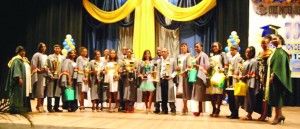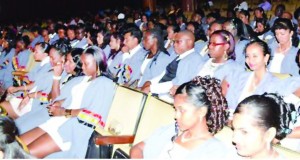
Chief Education Officer Olato Sam last Thursday saluted all of the nation’s teachers and educators for what he described as their tireless contributions to the improvement of the education system, as he delivered the feature address at the Cyril Potter College of Education’s (CPCE) 79th graduation ceremony.
He said government’s investment in the training and upgrading of educational facilities must be matched with the quality of the teachers necessary to take the system forward.
CPCE is on the upsurge and the graduates, according to Sam, must reflect the quality of investments being made towards their training.
He urged the 336 graduates to “not be complacent and let others denigrate your chosen profession, stand up, especially to those who don’t have any idea or understand the sacrifices that you go through to make a difference”.
He also reminded those who were successful to continue studying so as to improve themselves and those who will benefit from their teaching.

graduation ceremony at the National Cultural Centre
CPCE’s Principal Viola Rowe said that the institution remains committed to its mandate of preparing men and women from all regions of the country for formal entry into the teaching system, “using both face-to-face and distance modules (print and computer assisted). We are confident that our graduates are capable of providing high quality instruction to students in urban and rural classrooms of Guyana, contributing to the national development goal of having a competent citizenry”.
The principal said that 788 students initially registered for the academic year 2012- 2013, 17 per cent males and 88 per cent females for the programmes of associate degree, the trained teachers’ certificate and the teacher upgrading programmes.
She mentioned some of the challenges as being unable to attract enough part-time staffers; hence, the need to utilise fulltime staffers to compensate for this shortfall, the absence of technology support in some schools and an inability to incorporate information communication technology (ICT) in the teaching/ learning situation.
This, she noted, is being addressed by the Education Ministry’s drive to equip all schools with ICT laboratories.
The need to get some stakeholders to “buy-in” to the need for regular attendance resulted in some of the trainees withdrawing from the CPCE.
Seventy-four of the graduates are now trained in early childhood teaching, 110 for the primary level and 156 are certified to teach at the secondary level.



